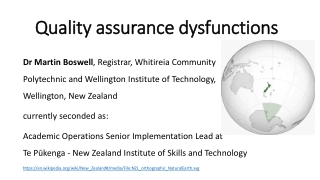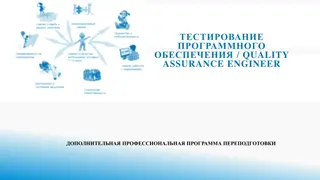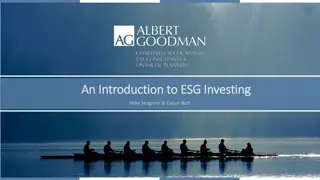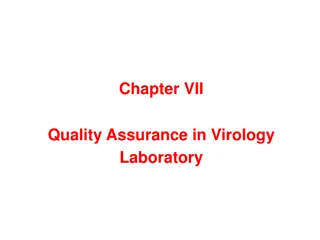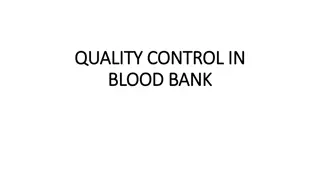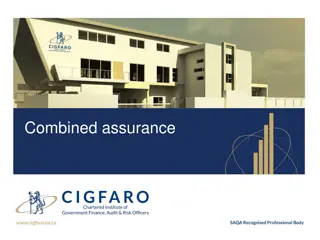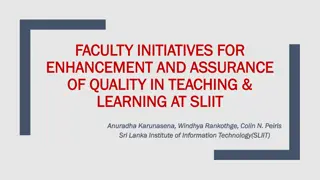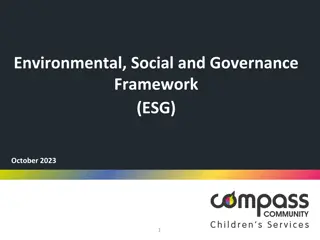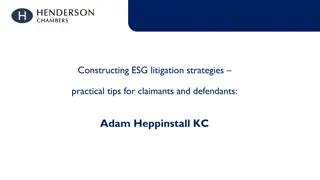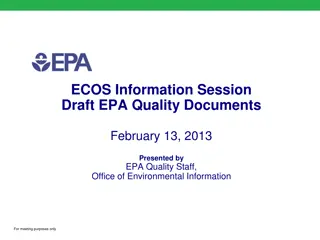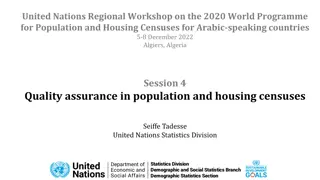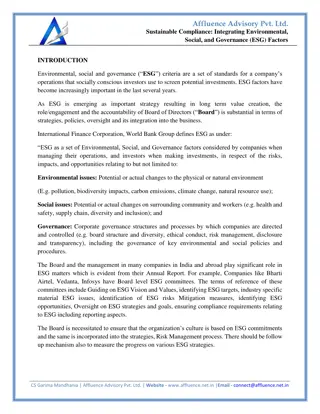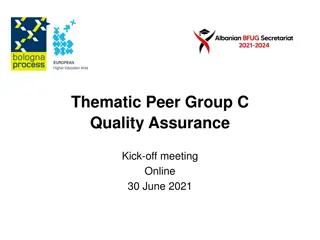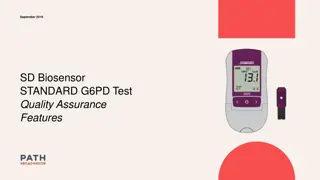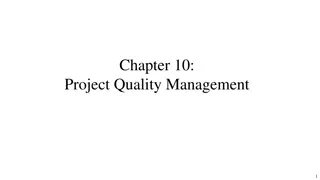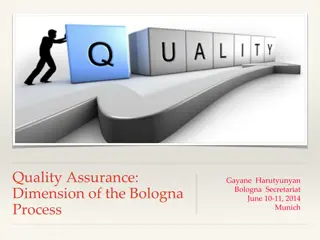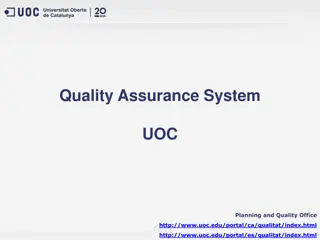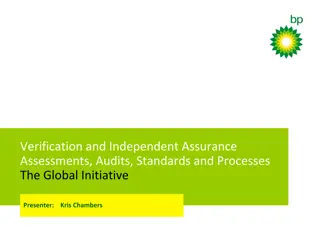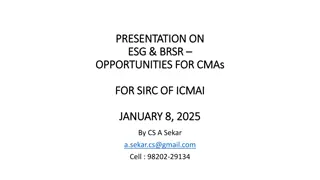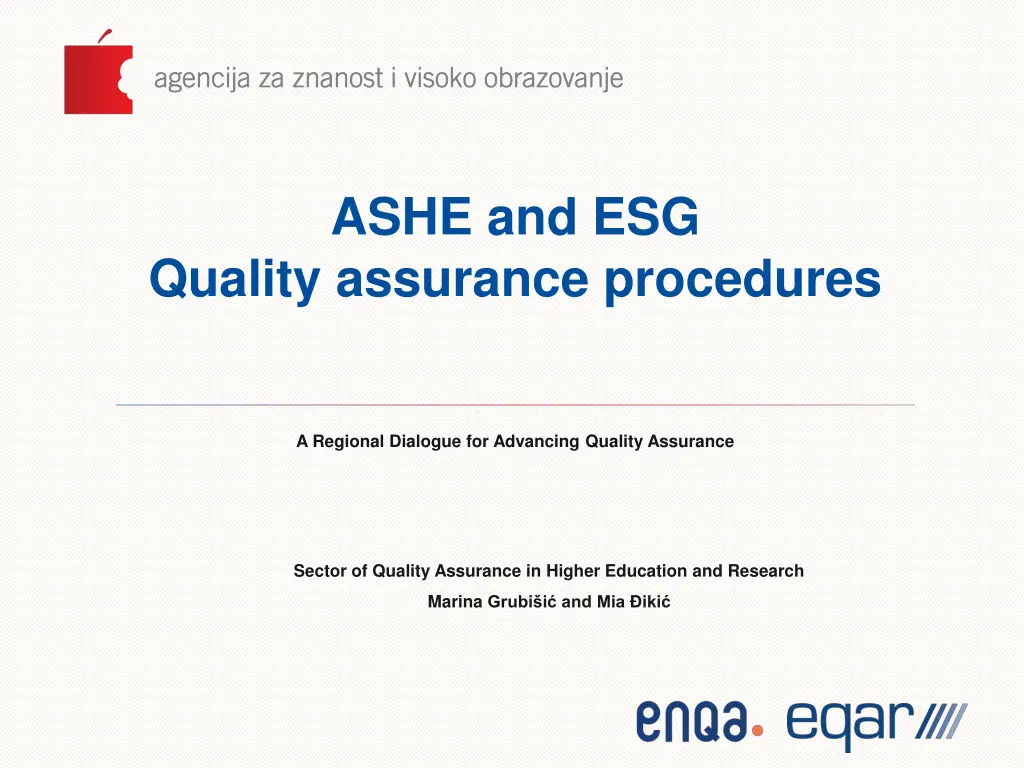
Advancing Quality Assurance in Higher Education and Research
Explore ASHE and ESG quality assurance procedures, involving stakeholders, peer-review experts, and compliance with ESG standards. Learn about ASHE's evaluation procedures, accreditation processes, and membership in international associations for quality assurance in higher education and science.
Download Presentation

Please find below an Image/Link to download the presentation.
The content on the website is provided AS IS for your information and personal use only. It may not be sold, licensed, or shared on other websites without obtaining consent from the author. If you encounter any issues during the download, it is possible that the publisher has removed the file from their server.
You are allowed to download the files provided on this website for personal or commercial use, subject to the condition that they are used lawfully. All files are the property of their respective owners.
The content on the website is provided AS IS for your information and personal use only. It may not be sold, licensed, or shared on other websites without obtaining consent from the author.
E N D
Presentation Transcript
ASHE and ESG Quality assurance procedures A Regional Dialogue for Advancing Quality Assurance Sector of Quality Assurance in Higher Education and Research Marina Grubi i and Mia iki
Content Agency for Science and Higher Education Overview of ASHE s evaluation procedures Compliance of procedures with ESG standards Involvement of stakeholders Peer-review experts and training module for experts
Agency for Science and Higher Education
Agency for Science and Higher Education 2005 founding of ASHE 2011 membership in ENQA / EQAR 2017 and 2022 ENQA membership renewal 2022 new Law on Quality Assurance in Higher Education and Science ASHE is internationally active and is a member of many international associations such as ECA, CHEA, CEENQA and others
Agency for Science and Higher Education Accreditation Council Complaints Committee Follow-up Committee The work of all bodies includes the participation of different stakeholders, including students
Overview of ASHEs Evaluation Procedures
Overview of ASHEs Evaluation Procedures Initial accreditation Reaccreditation Thematic accreditation One-off evaluation Cross-border evaluation Accreditation of the joint study program between domestic and foreign HEI European Approach
Initial accreditation Initial accreditation of higher education institutions and research institutes Initial accreditation of new study programme or changes to the program as prescribed by law regulative (change of program provider, location of delivery, language etc.) Special procedures for doctoral studies and online studies.
Reaccreditation Reaccreditation of higher education institutions or research institutes Periodic procedure (every five years) In accordance with the previous legal regulations, a reaccreditation procedure for all doctoral studies in Croatia was carried out
Thematic and one-off evaluation; cross-border Thematic evaluation focuses on a particular topic and does not result in a formal outcome One-off evaluation refers to one or more areas of activity of a higher education institution or a scientific institute Purpose: To address particular issues, promote best practices, and inform policy decisions. Cross-border evaluation of higher education institutions and evaluation of research institutes
European Approach to joint study program Higher education institutions participating in the implementation of joint programmes jointly select an agency (must be registered in EQAR) to conduct the evaluation process ASHE carries out accreditation in accordance with the European approach to quality assurance in joint studies ASHE, based on the positive outcome of another EQAR-registered agency, also issues a licence
Evaluation procedures Peer-review (at least 5 expert panel members) Quantitative and qualitative data (Self-evaluation document) Site visit Report Comment on the Report Accreditation Council Follow-up procedure
Compliance of procedures with ESG standards
ESG Standards and Guidelines for QA in the EHEA Part II: Part III: Part I: Internal Quality Assurance External Quality Assurance Quality Assurance Agencies
Quality Assurance Internal QA External QA It is implemented by institution itself It is implemented by external independent body (QA agency) Does not include external expert panel Includes external expert panel
ESG II: Standards and Guidelines for External QA 2.1 Consideration of internal quality assurance 2.2 Designing methodologies fit for purpose 2.3 Implementing processes 2.4 Peer-review experts 2.5 Criteria for outcomes 2.6 Reporting 2.7 Complaints and appeals
2.1 Consideration of internal quality assurance External quality assurance should address the effectiveness of the internal quality assurance processes described in Part 1 of the ESG. 1.1 Policy for quality assurance 1.2 Design and approval of programmes 1.3 Student-centred learning, teaching and assessment 1.4 Student admission, progression, recognition and certification 1.5 Teaching staff 1.6 Learning resources and student support 1.7 Information management 1.8 Public information 1.9 On-going monitoring and periodic review of programmes 1.10 Cyclical external quality assurance
Compliance of ASHE procedures with ESG standards 1. Higher education institution management and quality assurance (ESG 1.1, ESG 1.7 and ESG 1.8) 2. Study programmes and lifelong learning programmes (ESG 1.2 and ESG 1.9) 3. Student-centred learning and teaching the teaching process and student support (ESG 1.3, ESG 1.4 and ESG 1.6) 4. Teaching capacities and infrastructure of the higher education institution (ESG 1.5 and ESG 1.6)
Standards in ASHEs procedures Standard (clearly defined level of quality), criteria (prescribed by law), elements and indicators (are used to asses level of compliance with standards), sources (examples that can be used as quidelines) The quality standards are divided into assessment areas Ex. Initial accreditation (doctoral s.p.): I Internal QA II Study programme III Teaching process and student support IV Teaching and supervisior resources and infrastructure
Standards in ASHEs procedures I. Internal Quality Assurance 1.1 Planning and proposing of the doctoral study programme are based on the strategy of scientific research spanning several years in the scientific field in which the study programme will be delivered and the higher education institution development plan. It is connected to the national development and the labour market, and various stakeholders, including doctoral candidates, were involved in its development. Not fulfilled Partly fulfilled Fulfilled Elements and indicators of the standard Planning and proposing the doctoral study programme is aligned with the mission and strategic goals of the higher education institution. Planning and proposing of the doctoral study programme is aligned with the strategy of scientific research of the higher education institution. Planning and proposing of the doctoral study programme contributes to the national development of higher education and science. Planning and proposing of the doctoral study programme is aligned with the National Development Strategy of the Republic of Croatia for the period until 2030. Labour market analysis has been considered when proposing the doctoral study programme. Various stakeholders, including doctoral candidates, were involved in the process of planning and proposing of the study programme. In the course of proposing a new doctoral study programme, an opinion of the Croatian Employment Service on the compatibility of the study programme with the labour market, i.e. evidence that an application to issue an opinion was submitted to the Croatian Employment Service at least 30 days prior. The higher education institution was not issued a letter of expectation for performing higher education activity at the moment of submitting the application. Sources for assessing the fulfilment of the standard Strategy of scientific research for a period of several years for the scientific field in which the study programme is delivered; Doctoral study programme proposal; Analysis of compatibility of the doctoral study programme with strategic goals of the higher education institution; Decision of the expert body (faculty council, university senate) on adopting the doctoral study programme proposal; Analysis of minimum institutional requirements for comparability of the doctoral study programme with similar accredited doctoral study programmes in the Republic of Croatia and EU Member States; Feasibility study justifying the delivery of the doctoral study programme (in the case of a public higher education institution); Analysis of alignment of the doctoral study programme with the National Development Strategy of the Republic of Croatia; A decision to appoint a working group for planning and proposing the doctoral study programme; Conclusions, minutes of the meetings and similar documents proving stakeholder involvement in the procedure of proposing of the doctoral study programme; Examples of stakeholder involvement in the planning and proposing of the new doctoral study programme; Opinion of the Croatian Employment Service on the compatibility of the study programme with the labour market, i.e. evidence that an application to issue an opinion was submitted to the Croatian Employment Service at least 30 days prior.
Standards in ASHEs procedures IV. Teaching and supervision resources and infrastructure 4.1 The higher education institution has ensured an adequate number of teachers and supervisors for the delivery of the study programme and facilitate the completion of the study programme. Elements and indicators of the standard The higher education institution has an adequate number of teachers employed on scientific-teaching i.e. artistic-teaching positions full time, and an adequate number of teachers appointed in the scientific area in which the doctoral study programme is being proposed (21 teachers at universities, at least three of which appointed in the scientific area, and at least seven teachers at faculties or academies of art, at least three of which appointed in the relevant scientific area). The higher education institution employs teachers who deliver at least 50% of all forms of direct instruction full time and on an indefinite term basis. The ratio of the total number of students enrolled and teachers employed full time as well as teachers with nominal titles does not exceed 30:1 (when calculating the ratio, the number of working hours of teachers who are not employed full time is added up to meet the number of working hours required of a full-time teacher). The total annual teaching load of all teachers at the public higher education institution does not exceed 20% of the total annual teaching load as determined by the Collective Agreement for Science and Higher Education. Total annual teaching load of an individual teacher does not exceed 20% of the total annual teaching load. Teachers and supervisors have adequate qualifications for the delivery of the doctoral study programme in the scientific area and field in which the programme is proposed. Sources for assessing the fulfilment of the standard Number of employment contracts of the scientific-teaching staff employed full time; Letter of intent to hire teachers with nominal titles; Information on the coverage of teaching delivered by own staff; Staff teaching load; Doctoral student-teacher ratio; Ratio of the number of available supervisors and admission quota; CROSBI CroRIS. Not fulfilled Partly fulfilled Fulfilled
Involvement of stakeholders Forms of stakeholder involvement: Representation in QA committees - Accreditation Council, Follow-up Committee, Complaints Committee and governance - Management Board All key documents and procedures related to quality assurance are subject to public consultation before final adoption Providing feedback through surveys and focus groups Serving on quality assurance panel members Engaging in external evaluation processes at their institution
How to enhance Stakeholder Participation Clear communication and transparency Stakeholder involvement is not a one-time event, but a continuous process Participation in bodies ensures that quality assurance is not top-down but a shared responsibility Conferences, workshops, webinars
Workshops for HEIs At the beginning of each accreditation cycle for all HEIs (informing about changes/updated documents) Annual workshops for HEIs included in the accreditation plan for the next year This year we will have 2 workshops First in December for HEIs who are having site visit in spring Second in May for HEIs who are having site visit in autumn -general information about accreditation -self-assessment process -accreditation standards, indicators, evidences -IT system for collecting the data additional workshop -accreditation procedure
Conferences, webinars on different topics Topics related to ESG I Series of workshops on topics identified as a challenge in accreditation - development of study programmes based on LO and CroQF - student centred learning, new teaching approaches - student assessment - strengthening internationalization Actual topics and trends - joint programmes, European universities
Open call for panel members Open call for researchers, teachers at a higher education institutions and students to participate as members of expert panels in the external evaluation procedures Published on our website and the websites of partner agencies Direct invitation to student union and associations
Expert panel composition 2-3 National experts 2-3 1 International experts tSStudent member University (college) professors University (college) professors
Involving students in external QA Mandatory members of expert panels in accreditation procedures with the same obligations and rights as other members (the same duties and fees) Participate the same training together with other panel members (online and onsite) Student member chairing the meeting with students and actively participates/asking questions at other meetings
Online training 2 Topics Legislative framework and ASHE documentation for conducting accreditation HE system in Croatia and its specificities Procedure of accreditation Accreditation standards Assessment against standards Writing the final report Roles and obligations of panel members and panel chair
Thank you for your attention! marina.grubisic@azvo.hr mia.dikic@azvo.hr www.azvo.hr


